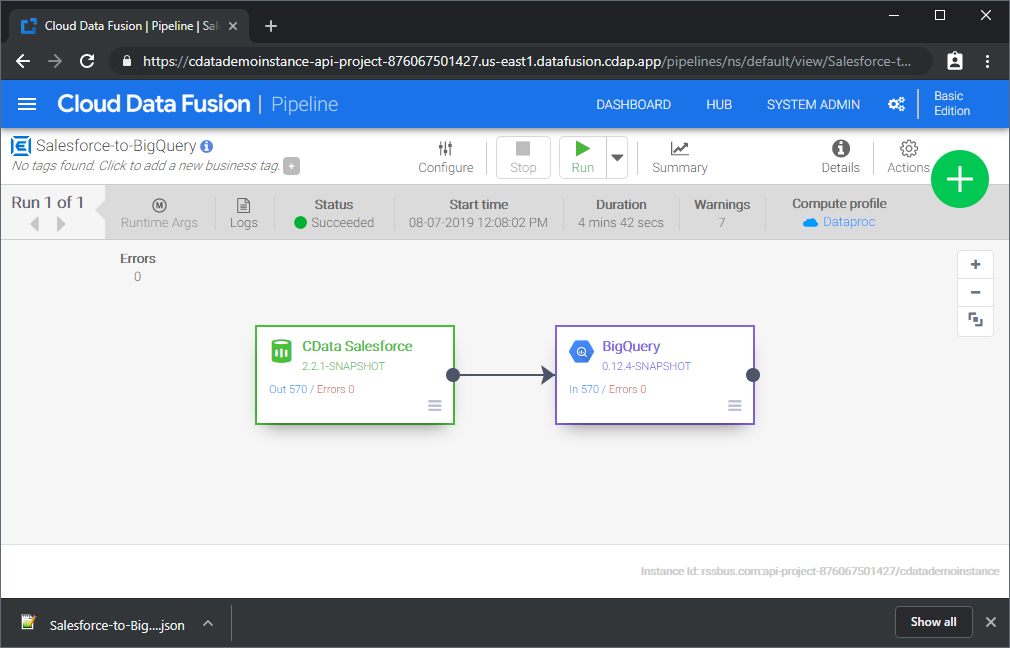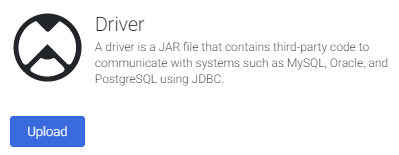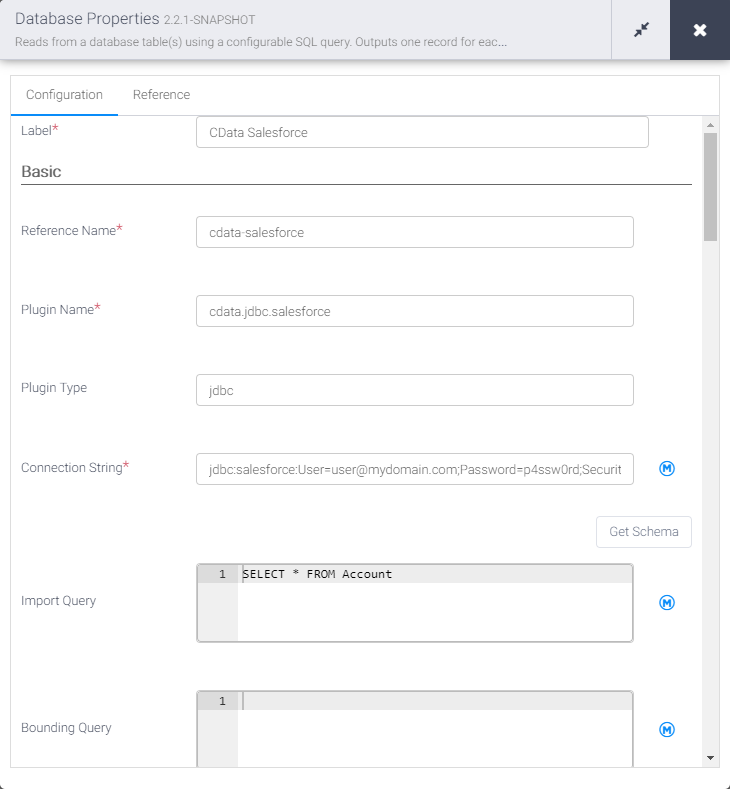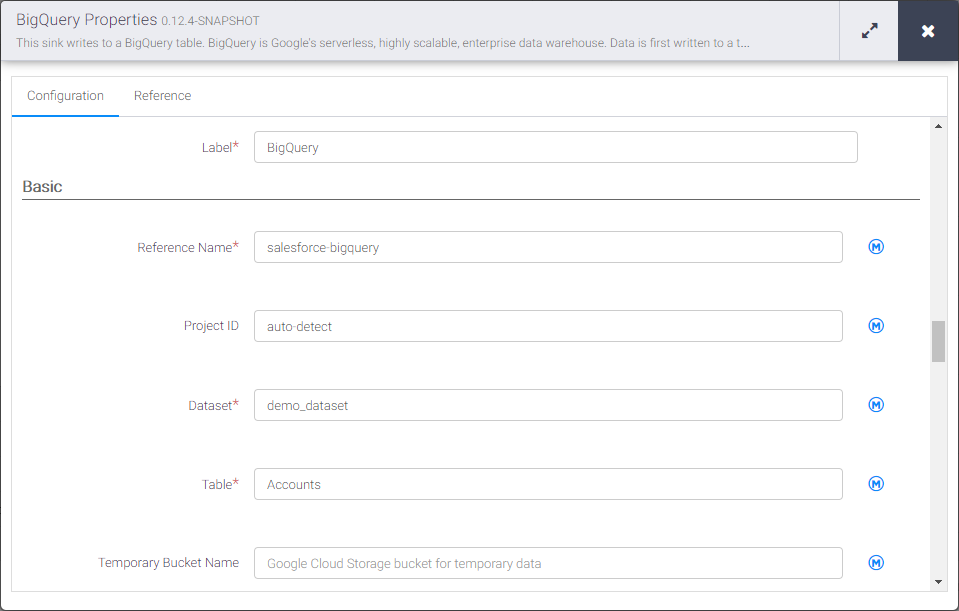Discover how a bimodal integration strategy can address the major data management challenges facing your organization today.
Get the Report →Build BigCommerce-Connected ETL Processes in Google Data Fusion
Load the CData JDBC Driver into Google Data Fusion and create ETL processes with access live BigCommerce data.
Google Data Fusion allows users to perform self-service data integration to consolidate disparate data. Uploading the CData JDBC Driver for BigCommerce enables users to access live BigCommerce data from within their Google Data Fusion pipelines. While the CData JDBC Driver enables piping BigCommerce data to any data source natively supported in Google Data Fusion, this article walks through piping data from BigCommerce to Google BigQuery,
Upload the CData JDBC Driver for BigCommerce to Google Data Fusion
Upload the CData JDBC Driver for BigCommerce to your Google Data Fusion instance to work with live BigCommerce data. Due to the naming restrictions for JDBC drivers in Google Data Fusion, create a copy or rename the JAR file to match the following format driver-version.jar. For example: cdatabigcommerce-2020.jar
- Open your Google Data Fusion instance
- Click the to add an entity and upload a driver
![]()
- On the "Upload driver" tab, drag or browse to the renamed JAR file.
- On the "Driver configuration" tab:
- Name: Create a name for the driver (cdata.jdbc.bigcommerce) and make note of the name
- Class name: Set the JDBC class name: (cdata.jdbc.bigcommerce.BigCommerceDriver)
![Configuring the driver (Salesforce is shown.)]()
- Click "Finish"
Connect to BigCommerce Data in Google Data Fusion
With the JDBC Driver uploaded, you are ready to work with live BigCommerce data in Google Data Fusion Pipelines.
- Navigate to the Pipeline Studio to create a new Pipeline
- From the "Source" options, click "Database" to add a source for the JDBC Driver
![Adding a database source]()
- Click "Properties" on the Database source to edit the properties
NOTE: To use the JDBC Driver in Google Data Fusion, you will need a license (full or trial) and a Runtime Key (RTK). For more information on obtaining this license (or a trial), contact our sales team.
- Set the Label
- Set Reference Name to a value for any future references (i.e.: cdata-bigcommerce)
- Set Plugin Type to "jdbc"
- Set Connection String to the JDBC URL for BigCommerce. For example:
jdbc:bigcommerce:RTK=5246...;OAuthClientId=YourClientId; OAuthClientSecret=YourClientSecret; StoreId='YourStoreID'; CallbackURL='http://localhost:33333'InitiateOAuth=GETANDREFRESH;BigCommerce authentication is based on the standard OAuth flow. To authenticate, you must initially create an app via the Big Commerce developer platform where you can obtain an OAuthClientId, OAuthClientSecret, and CallbackURL. These three parameters will be set as connection properties to your driver.
Additionally, in order to connect to your BigCommerce Store, you will need your StoreId. To find your Store Id please follow these steps:
- Log in to your BigCommerce account.
- From the Home Page, select Advanced Settings > API Accounts.
- Click Create API Account.
- A text box named API Path will appear on your screen.
- Inside you can see a URL of the following structure: https://api.bigcommerce.com/stores/{Store Id}/v3.
- As demonstrated above, your Store Id will be between the 'stores/' and '/v3' path paramters.
- Once you have retrieved your Store Id you can either click Cancel or proceed in creating an API Account in case you do not have one already.
Built-in Connection String Designer
For assistance in constructing the JDBC URL, use the connection string designer built into the BigCommerce JDBC Driver. Either double-click the JAR file or execute the jar file from the command-line.
java -jar cdata.jdbc.bigcommerce.jarFill in the connection properties and copy the connection string to the clipboard.
![Using the built-in connection string designer to generate a JDBC URL (Salesforce is shown.)]()
- Set Import Query to a SQL query that will extract the data you want from BigCommerce, i.e.:
SELECT * FROM Customers
![Configuring the database source]()
- From the "Sink" tab, click to add a destination sink (we use Google BigQuery in this example)
- Click "Properties" on the BigQuery sink to edit the properties
- Set the Label
- Set Reference Name to a value like bigcommerce-bigquery
- Set Project ID to a specific Google BigQuery Project ID (or leave as the default, "auto-detect")
- Set Dataset to a specific Google BigQuery dataset
- Set Table to the name of the table you wish to insert BigCommerce data into
![Configuring the BigQuery sink]()
With the Source and Sink configured, you are ready to pipe BigCommerce data into Google BigQuery. Save and deploy the pipeline. When you run the pipeline, Google Data Fusion will request live data from BigCommerce and import it into Google BigQuery.

While this is a simple pipeline, you can create more complex BigCommerce pipelines with transforms, analytics, conditions, and more. Download a free, 30-day trial of the CData JDBC Driver for BigCommerce and start working with your live BigCommerce data in Google Data Fusion today.












